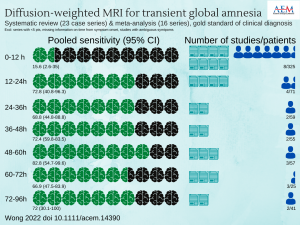Early MRI for Sudden Temporary Memory Loss Not Likely to Yield Useful Information
MRI unlikely to show lesions in patients with transient global amnesia (TGA) early after symptom onset, but sensitivity increases with time
DES PLAINES, ILLINOIS, UNITED STATES, April 19, 2022 /EINPresswire.com/ -- Diffusion-weighted magnetic resonance imaging (DW-MRI) lesions are uncommon in patients with transient global amnesia (TGA) early after symptom onset, but the sensitivity (i.e., positivity rate) increases with time. Despite the limited quality of existing evidence, obtaining an early DW-MRI in patients with clinical diagnosis of TGA in the acute setting is likely a low-yield test. That is the conclusion of the study titled "Sensitivity of diffusion‐weighted magnetic resonance imaging in transient global amnesia as a function of time from symptom onset," to be published in the April 2022 issue of Academic Emergency Medicine (AEM), a peer-reviewed journal of the Society for Academic Emergency Medicine (SAEM).The lead author of the study is Matthew L. Wong, MD, MPH, assistant professor of emergency medicine at Harvard Medical School and attending physician at Beth Israel Deaconess Medical Center in Boston, Massachusetts.
Results of the study are discussed in a recent AEM podcast titled Don’t You Forget About Me — DW:MRI Sensitivity for Transient Global Amnesia.
The authors performed a systematic review and meta-analysis to determine the sensitivity of DW-MRI as a function of time from symptom onset compared to clinical diagnosis. They hypothesized that the sensitivity of DW-MRI is low but increases over time, which has implications about its clinical utility, particularly in emergency department (ED) patients.
In patients presenting in the ED with typical transient global amnesia symptoms who fulfill clinical diagnostic criteria, urgent magnetic resonance imaging in the first 12 hours has very low sensitivity and will likely not yield etiologically or diagnostically useful information. The certainty in the existing evidence, however, is limited by the low quality of included studies in this meta-analysis in large part due to variation in magnetic resonance image quality. Future research will need to better elucidate whether there is any beneficial effect of early neuroimaging on clinically important outcomes of acute transient global amnesia patients.
###
ABOUT ACADEMIC EMERGENCY MEDICINE
Academic Emergency Medicine, the monthly journal of Society for Academic Emergency Medicine, features the best in peer-reviewed, cutting-edge original research relevant to the practice and investigation of emergency care. The above study is published open access and can be downloaded by following the DOI link: 10.1111/acem.14390. Journalists wishing to interview the authors may contact Tami Craig at tcraig@saem.org.
ABOUT THE SOCIETY FOR ACADEMIC EMERGENCY MEDICINE
SAEM is a 501(c)(3) not-for-profit organization dedicated to the improvement of care of the acutely ill and injured patient by leading the advancement of academic emergency medicine through education and research, advocacy, and professional development. To learn more, visit saem.org.
Tami Craig
SAEM
+1 847-813-5734
email us here
Legal Disclaimer:
EIN Presswire provides this news content "as is" without warranty of any kind. We do not accept any responsibility or liability for the accuracy, content, images, videos, licenses, completeness, legality, or reliability of the information contained in this article. If you have any complaints or copyright issues related to this article, kindly contact the author above.

